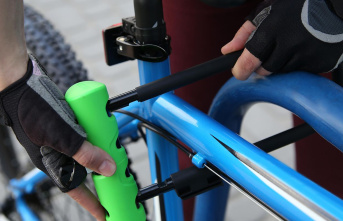" Let it die ". "Let it die ". Here are the words of Tunde Wey, to discuss the crisis that is currently facing the foodservice industry. In an essay published in several parts on Instagram, the chief cook nigerian based in New Orleans, Louisiana, made a scathing criticism of an industry that, according to him, compiles all the ills of the society. The model is adept at agricultural practices, destructive, "gentrifie" neighborhoods and cities, and above all, as well as widening inequalities. For Tunde Wey, the kitchen is not a matter of sharing and exchange. It is " political ", he says to the New York Times, which cited among The 16 heads blacks that move the gastronomy in the United States.
Read also african Cuisine : the key to becoming a (good) head
against the current of most of the leaders, the Nigerian makes his cuisine a tool of advocacy, to better highlight the american divisions. When he opened his first catering stalls in 2014, it sets its prices according to the median salary assigned to each community. Thus, in its establishment Saartj of New Orleans – named in tribute to the South African Saartjie Baartman exhibited in Europe for his wide post – the Whites pay two and a half times more expensive on their plate than people of color. Is the approximate equivalent of the disparity of income between the two groups. For a client black, isi-ewu, a goat stew which is traditionally consumed by the population of the igbo, is charged twelve dollars. For the client white, it will cost him thirty.
A method incisive, that the cook also apply on dinners of which he is the organizer. For the participants of black to the "Hot Chicken Shit" in Nashville, tn, in 2018, the piece of chicken was free. For the Whites, on the other hand, the bill was salty : 100 dollars for the same piece, 1000 for four coins, and for foodies who wanted a whole chicken, the gift of a deed to property in North Nashville, the popular quarter of the city. Prior to this, Tunde Wey had organized other events of the same kind, the " Blackness in America ", that brought together artists, teachers and activists from a variety of backgrounds. Only requirement for the participants of Oakland, Pittsburgh, Austin or Memphis invited to taste the soup, egusi and fried plantains : discuss racism in the United States.
also Read Mory Sacko : "african cuisine is very diverse, there are many things to do"
undocumented, "a malaise constant"
Born in Lagos, Akintunde Asuquo Osaigbuovo Ojo Wey of its full name, arrived in the country at the age of fifteen years. Her parents then for him and his two brothers of major projects. Tunde will be doctor. The young man lives with his aunt in Detroit, and began his studies. But the student, there is little interest. He gives up and climbs up a restaurant, " Revolver ", a few years later in 2013 with his former roommate. He left the school the following year to found her own catering stalls nigerians, which he calls, naturally, " Lagos ". Several see the light of day, New York, and Chicago in particular. Meanwhile, Tunde Wey loses her visa and is experimenting with the lives of undocumented migrants. "It was like living with a chronic illness, malaise, constant ", he says to the american edition of the magazine GQ.
Without the invaluable sesame, the Nigerian takes over the plane, and to prospect, made the most of his travel by bus. His passport of nigeria allows him to move the controls. But on a route New Orleans-Los Angeles, his situation caught up with him. Near Las Cruces, New Mexico, it is controlled in the bus by an agent of the borders. Tunde Wey and arrested and spend twenty days in detention. The deposit paid to the judge, it appears free. But the experience has been painful. "It is a moment that we only see in the movies," he recalls to GQ. "I was sweating. My palms were wet. Very few people feel this feeling : when you have no control over your life. "This episode inspired him to a new idea. Last year, after having finally got his papers, he launches in Pittsburgh " Love Trumps Hate ", a series of dinners to the blind where to be found around dishes nigerian immigrants and american citizens. A unifying event. What that says its organizer.
A post to instagram of Tunde Wey, an account which blends kitchen, and policy. © Instagram
Read also the Diaspora – Fati Niang : "I want to promote the african food"
The Point Africa : When you have opened your first catering stalls in 2015, you have immediately offered dishes nigerians. Why ?
Tunde Wey : It is the only kitchen that I know of do. When I was in Nigeria, surprisingly, I really did not like to cook. At the time, it did not interest me. So I learned everything on YouTube arriving in the United States. Cooking products in me has seemed to be logical, natural. It is for this reason that in launching my first business establishment I don't ask myself questions.
What have been the reactions of your customers ? The success has there been to the appointment ?
At the beginning, the reactions were not very good. It was very mixed, some loved, others hated it. The kitchen nigerian and african in general is not at all known here in the United States, at least to the general public. But it is done carefully place in the baking circles, among the connoisseurs. America discovers little by little, the flavours of the continent.
Read also Christian Abégan – The mil, the queen of the "taste of Africa"
Assembly of dishes and recipes to nigerians. © DR
is there a dish or ingredient that you love to prepare ?
Not really. I cook fairly instinctive. In general, I'm going to make a trip to the market and I buy what attracts me at the time. My favorite dishes are of course derived from the yoruban culture to which I belong. I'm inspired by many of its dishes and its traditional ingredients. I like to cook mushrooms in the oil of palm nuts, for example.
in an article In the Times, it is written that you call your kitchen " food uncomfortable ". That is to say ?
These are the people who said it, not me. This is not my kitchen, which is uncomfortable, but what I'm doing : a tool to highlight racial discrimination. It is this that makes the audience uncomfortable.
These last few weeks have shown that this problem affects both the United States and Europe, and many countries of the world. This could lead you to export it to the international ?
The topic has been a lot of talk about him, and everywhere, it is true. Racism, xenophobia are the international problems. Even if this is not the order of the day, the state of the situation is that I could install anywhere. In France, the United Kingdom, Colombia.
And in Nigeria ?
Nigeria is my country. This is the place where I resource, where I share family moments. I do not seek the same thing. It is for this reason that I would not have the same projects elsewhere.
do you Think to open your own restaurant ? This kind of establishment is it appropriate for your message ?
any occasion is good to take for bringing people together from different backgrounds. Any dinner is conducive to the gathering, reflecting on topics that divide. But for now, I do not see myself opening a restaurant in good and due form. My pop-up and my dinners are enough for me. But who knows, maybe one day ?
Read also Gastronomy – Niclette Sossouvi : "make a fine kitchen but accessible"








